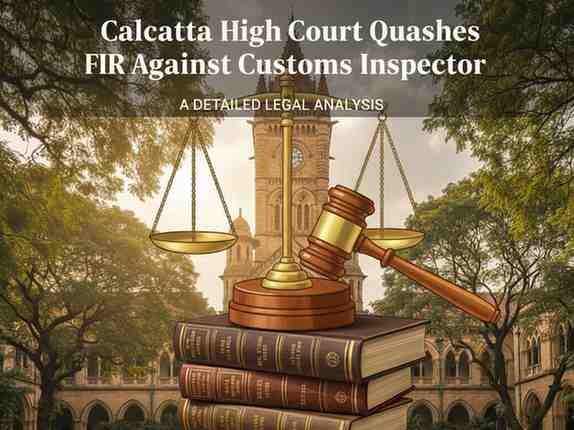The Calcutta High Court has quashed a molestation FIR filed against a customs inspector, citing the absence of a mandatory preliminary inquiry under Section 173(3) CrPC and misuse of the legal process. Read the full case explanation, implications, and FAQs.
Introduction
In a significant ruling, the Calcutta High Court quashed a molestation FIR registered against a customs inspector, stating that the complaint was filed without conducting the mandatory preliminary inquiry required under procedural law. The Court observed that the FIR was lodged in haste, lacked proper verification, and constituted a misuse of the legal process, which could result in severe prejudice against the accused.
This judgment emphasizes the importance of procedural safeguards, particularly in cases where criminal allegations may arise out of personal conflict, retaliation, or misinterpretation of events. The ruling reinforces that criminal law cannot be used as a tool of harassment.
Why the FIR Was Quashed
The High Court highlighted several reasons for setting aside the FIR:
Violation of Mandatory Preliminary Inquiry Requirement
The FIR was filed without conducting the required preliminary inquiry under Section 173(3) of the Code of Criminal Procedure (CrPC).
This section ensures that before an FIR is registered in complex or sensitive matters, the police should verify the authenticity and context of the complaint.
The Court ruled that failure to follow this step invalidated the basis of the FIR.
Possible Misuse of the Legal Process
The Court observed inconsistencies in the complaint and circumstances suggesting that the FIR may have been filed with malicious intentions.
Using criminal law for personal vengeance or pressure is considered a misuse of judicial mechanisms.
Lack of Prima Facie Evidence
During the review, the Court found that the materials presented did not justify the seriousness of the allegations.
The FIR appeared to lack credible, corroborated evidence necessary for a legitimate molestation charge.
Protection of the Rights of the Accused
The Court emphasized that while protecting victims is vital, the accused also has a constitutional right to fair treatment and due process.
Incorrect or unsupported allegations can ruin careers, reputations, and lives.
Legal Significance of the Ruling
Reinforces the Importance of Due Process
The decision underscores that police must follow mandatory investigation steps—especially in sensitive offences—to prevent wrongful prosecution.
Prevents Criminal Law From Being Misused
By quashing the FIR, the Court sent a clear message that false, inflated, or retaliatory allegations will not be entertained.
Highlights Policymaking Gaps
The ruling may push authorities to ensure better training of officers on handling harassment-related complaints while balancing rights of both parties.
Sets a Precedent for Similar Cases
Courts may now examine procedural compliance more strictly in cases of molestation, assault, or workplace harassment involving government officials.
Impact on Law-Enforcement and Institutions
- Police must conduct preliminary inquiries in non-cognizable or sensitive complaints.
- Government departments may strengthen internal complaint mechanisms to prevent external misuse.
- Accused officers gain additional protection against false allegations.
- Victims must ensure credible evidence and procedural adherence when filing complaints.
FAQ: Calcutta High Court’s Decision on Molestation FIR
Why did the Calcutta High Court quash the molestation FIR?
Because the FIR was filed without the mandatory preliminary inquiry under Section 173(3) CrPC, and appeared to misuse the legal process.
What does Section 173(3) of the CrPC require?
It mandates that police conduct a preliminary inquiry in specific types of complaints before formally registering an FIR, ensuring fairness and preventing misuse.
Can FIRs be quashed if filed maliciously?
Yes. High Courts have the power to quash FIRs under Section 482 CrPC if they are found to be baseless, malicious, or filed with the intent to harass.

























